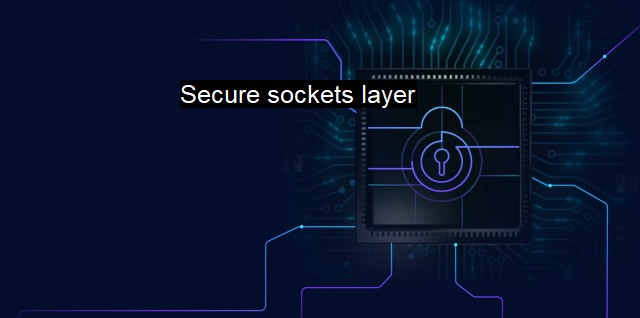What is Secure sockets layer?
Understanding the Role of Secure Sockets Layer (SSL) in Ensuring Authentication and Encryption in Cybersecurity: A Comprehensive Guide
Secure Sockets Layer, or SSL, is a standard protocol that is used for establishing encrypted links between a server and a client in online communication. Predominantly, SSL is used in securing data transfers, logins, credit card transactions, and confidential information exchanges over the internet. Developed by Netscape Communications Corporation in the 1990s, SSL has been adopted child-wide to allow for secure internet connections and vows to protect millions of people engaging in digital exchanges daily.SSL functions based on two integral concepts: encryption and the SSL certificate. Encryption refers to the transformation of data into a complex form that can only be read through an applicable decryption key. This ensures that data transmitted over networks is rendered un-interceptable and unreadable to unauthorized individuals.
The SSL certificate, on the other hand, is a small file installed on a web server protects sensitive information exchanged on the site, providing a secure connection between a web browser and the web server. When a visitor enters an SSL-protected site, their browser checks the site’s SSL certificate before establishing an encrypted link. This seamless process ensures the secure transmission of sensitive information.
Users can easily distinguish an SSL-protected site by looking for 'https' in a site's URL instead of 'http'. The 's' means that the website is secure and employs encryption to protect your data. Some browsers will also show a padlock icon or color the URL bar green, signaling an SSL-protected site.
The importance and necessity of SSL cannot be overstated. Any forms of data transmitted over the internet can potentially be intercepted by cybercriminals. With SSL's advanced encryption, companies and individuals are ensured that their sensitive information remain confidential and intact.
Cybersecurity complements SSL as procedures and measures designed to protect our internet-based systems, including hardware, software, and data, from cyber threats. The two fibres intertwining work together to provide an environment that is safe from digital espionage, ransomware, fraud, and more. They strengthen system defenses against hackers, phishing scams, and other harmful activities. SSL particularly helps in fending off man-in-the-middle attacks, where a malicious actor intercepts communication between two parties, imperceptibly altering the communications between them.
Pairing an SSL protocol with antivirus software can provide another solid layer of security. Antivirus software is designed to detect, prevent, and take action against malicious software hostilities like viruses, worms or Trojan horses. It can be seen as a SWAT team that patrols for, plays defense against, and pushes out threats. An updated antivirus can rectify vulnerabilities, close loopholes, and keep overall health of systems in check while SSL secures the data.
While SSL secures information transmission, antivirus software patrols within the system, constantly scanning files, code, or unknown software run within the network for potential threats and vulnerabilities. In case malicious code gets through, the antivirus then springs into action to disarm and delete the threat. This combination ensures data integrity and security when all deployed facets work as designed — creating a lock-and-key scenario that can remain virtually impenetrable for internet-based threats.
In our interconnected world where our lives revolve around the internet and we're only ever a click away from an accident, cybersecurity measures like SSL encryption and antivirus software offer a vital line of defense against pervasive online threats. As risks continue to evolve in complexity, these tools will continue to adapt and improve likewise, providing users with the confidence to exploit the benefits of internet without the fear.

Secure sockets layer FAQs
What is SSL?
SSL stands for Secure Sockets Layer. It is a security protocol used to encrypt the data transmission between a web server and a browser. SSL certificate ensures that the data remains private and safe, and no unauthorized party can intercept or tamper with it.Why is SSL important for website security?
SSL is essential for website security because it encrypts the data transmitted over the internet, including login credentials, credit card details, and other sensitive information. SSL certificates provide a secure and encrypted connection between the web server and the user's browser, making it harder for hackers to intercept and steal the data.How can I check if a website has an SSL certificate?
You can check if a website has an SSL certificate by looking for the lock icon in the address bar of your browser. If the website has an SSL certificate, you will see a padlock icon, and the URL will start with "https" instead of "http." You can also click on the padlock icon to view the SSL certificate details.What are the different types of SSL certificates?
There are three types of SSL certificates: Domain Validated (DV), Organization Validated (OV), and Extended Validation (EV). DV SSL certificates are the simplest and cheapest, and they only verify the domain ownership. OV SSL certificates require validation of the domain ownership and business registration. EV SSL certificates are the most expensive and rigorous, and they require extensive validation of the domain ownership, company registration, and legal status.| | A | | | B | | | C | | | D | | | E | | | F | | | G | | | H | | | I | | | J | | | K | | | L | | | M | |
| | N | | | O | | | P | | | Q | | | R | | | S | | | T | | | U | | | V | | | W | | | X | | | Y | | | Z | |
| | 1 | | | 2 | | | 3 | | | 4 | | | 7 | | | 8 | | |||||||